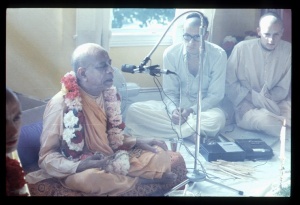BG 1.45: Difference between revisions
(Vanibot #0020 edit - link to the Version Compare feature) |
(Vanibot #0054 edit - transform synonyms into clickable links, which search similar occurrences) |
||
| Line 22: | Line 22: | ||
<div class="synonyms"> | <div class="synonyms"> | ||
''yadi'' | ''[//vanipedia.org/wiki/Special:VaniSearch?s=yadi&tab=syno_o&ds=1 yadi]'' — even if; ''[//vanipedia.org/wiki/Special:VaniSearch?s=mām&tab=syno_o&ds=1 mām]'' — me; ''[//vanipedia.org/wiki/Special:VaniSearch?s=apratīkāram&tab=syno_o&ds=1 apratīkāram]'' — without being resistant; ''[//vanipedia.org/wiki/Special:VaniSearch?s=aśastram&tab=syno_o&ds=1 aśastram]'' — without being fully equipped; ''[//vanipedia.org/wiki/Special:VaniSearch?s=śastra&tab=syno_o&ds=1 śastra]-[//vanipedia.org/wiki/Special:VaniSearch?s=pāṇayaḥ&tab=syno_o&ds=1 pāṇayaḥ]'' — those with weapons in hand; ''[//vanipedia.org/wiki/Special:VaniSearch?s=dhārtarāṣṭrāḥ&tab=syno_o&ds=1 dhārtarāṣṭrāḥ]'' — the sons of Dhṛtarāṣṭra; ''[//vanipedia.org/wiki/Special:VaniSearch?s=raṇe&tab=syno_o&ds=1 raṇe]'' — on the battlefield; ''[//vanipedia.org/wiki/Special:VaniSearch?s=hanyuḥ&tab=syno_o&ds=1 hanyuḥ]'' — may kill; ''[//vanipedia.org/wiki/Special:VaniSearch?s=tat&tab=syno_o&ds=1 tat]'' — that; ''[//vanipedia.org/wiki/Special:VaniSearch?s=me&tab=syno_o&ds=1 me]'' — for me; ''[//vanipedia.org/wiki/Special:VaniSearch?s=kṣema&tab=syno_o&ds=1 kṣema]-[//vanipedia.org/wiki/Special:VaniSearch?s=taram&tab=syno_o&ds=1 taram]'' — better; ''[//vanipedia.org/wiki/Special:VaniSearch?s=bhavet&tab=syno_o&ds=1 bhavet]'' — would be. | ||
</div> | </div> | ||
Latest revision as of 15:14, 17 February 2024

A.C. Bhaktivedanta Swami Prabhupada
TEXT 45
- यदि मामप्रतीकारमशस्त्रं शस्त्रपाणयः ।
- धार्तराष्ट्रा रणे हन्युस्तन्मे क्षेमतरं भवेत् ॥४५॥
- yadi mām apratīkāram
- aśastraṁ śastra-pāṇayaḥ
- dhārtarāṣṭrā raṇe hanyus
- tan me kṣemataraṁ bhavet
SYNONYMS
yadi — even if; mām — me; apratīkāram — without being resistant; aśastram — without being fully equipped; śastra-pāṇayaḥ — those with weapons in hand; dhārtarāṣṭrāḥ — the sons of Dhṛtarāṣṭra; raṇe — on the battlefield; hanyuḥ — may kill; tat — that; me — for me; kṣema-taram — better; bhavet — would be.
TRANSLATION
Better for me if the sons of Dhṛtarāṣṭra, weapons in hand, were to kill me unarmed and unresisting on the battlefield.
PURPORT
It is the custom—according to kṣatriya fighting principles—that an unarmed and unwilling foe should not be attacked. Arjuna, however, decided that even if attacked by the enemy in such an awkward position, he would not fight. He did not consider how much the other party was bent upon fighting. All these symptoms are due to soft-heartedness resulting from his being a great devotee of the Lord.